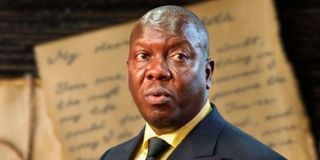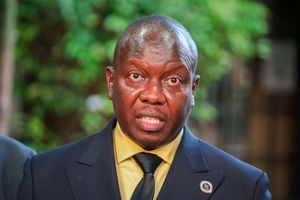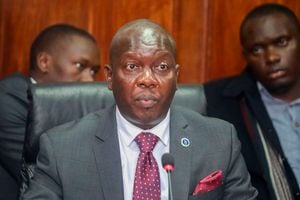
The Director of Public Prosecutions (DPP), Renson Ingonga.
The Director of Public Prosecutions (DPP), Renson Ingonga, is a man in the spotlight after fresh concerns about the withdrawal of high-profile graft cases in court and the closing of files.
Correspondence seen by the Weekly Review reveals the inner workings of the justice system with the pen of arguably the most powerful players, featuring prominently in the withdrawal of ongoing cases, denying consent to prosecute, returning the investigation file for lack of sufficient evidence, or simply failing to act.
Then there are the investigating agencies and the courts, which do not always agree with such decisions, triggering a push and pull that sometimes plays out in public.
Some of the communication from the DPP involves high-impact cases, including shelving charges against Tharaka-Nithi Governor Muthomi Njuki, former Cabinet Secretary Najib Balala, and former governors Wycliffe Oparanya (Kakamega) and Mike Sonko (Nairobi).
The DPP has also declined to pursue the former Kirinyaga Deputy Governor Peter Ndambiri and his close family members in a conflict of interest case as well as an alleged multi-million shillings tender scam at the National Youth Service (NYS).
Questions, however, linger on the cost implications on the taxpayers, such as on some projects that were suspected to involve questionable deals. Some of those investigated recently include the multi-million-shilling peace dam in Turkana County, Chuka Hospital’s incinerator procurement case, and Nairobi County’s street lighting.
At the trial stage, the DPP has in some instances made a U-turn, arguing that the evidence that he relied upon to commence prosecution is no longer sufficient to warrant continuation of the case.
In some cases, the DPP has argued that he had received a request from the accused to review the evidence and, after taking such action, concurred with the accused person to withdraw the case.
In the latest move that has attracted the protest of investigators, the DPP has ordered the closure of the Sh6 billion fraudulent and ghost procurement claims case at NYS by the Ethics and Anti-Corruption Commission (EACC) after denying consent to charge.
Mr Ingonga argued that the key witnesses in the matter are already facing other criminal charges for falsification of documents in a different NYS case involving former PS Lilian Omollo, therefore, they may not be credible and reliable witnesses.
Further, he states that evidence does not establish non-delivery of the goods. This means the companies or directors may pursue payment of Sh6 billion from NYS in the case resulting from the 2014-18 financial years.
Last year, the EACC forwarded a report to the DPP through a letter dated August 14, 2023, to charge NYS officials.
The investigators wanted suspects charged with conspiracy to commit an offence of corruption, knowingly giving misleading documents, uttering false documents, and making false documents, among others.
“One of the suppliers claimed to have supplied milk powder worth Sh900 million. During investigations, he could not explain the thousands of trucks that would be required to transport this or where goods were stored. NYS itself does not have the capacity to store such a volume of supplies,” reads the EACC report.
The investigations established that there were no requisitions attached to the payment vouchers, hence no evidence that the goods and services allegedly supplied had been ordered by NYS.
“The LPOs were not signed by an accountant to commit the funds in the vote book as required by Section 52 of the Public Finance Management Regulation on Vote Control Procedures,” the file to DPP reads.
The file further says: “Some of the documents (LPOs) used to process payment were not genuine, and goods alleged to have been supplied were not supplied to justify any payment.”
Another instance is the withdrawal of the case regarding the irregular payment by the Tourism Fund for consultancy services regarding the proposed construction of Ronald Ngala Utalii College in Vipingo, Kilifi County, for lack of evidence.
Mr Balala was among those accused of inflation of cost from the estimated Sh1.9 billion, which was allocated by Cabinet to Sh8.5 billion. The case was withdrawn.
The EACC investigated Mr Njuki’s procurement of a Sh34 million incinerator but was eventually dropped. The DPP first directed that the proceeding be suspended to review the investigation file and has since withdrawn the case.
In June 2024, senior principal prosecution counsel Duncan Ondimu wrote on behalf of the DPP to their lower eastern region regional coordinator Daniel Kariuki, indicating that they had received a request from the governor seeking to review evidence.
“To ensure the DPP responds to the request, kindly submit the duplicate. The DPP has further directed that the hearing should not proceed until further directions are issued,” reads the letter from Mr Ondimu to Mr Kariuki.
He has also denied consent to prosecute cases before suspects are taken to court by withdrawing approval issued earlier.
Investigation into Mr Oparanya, a Cabinet Secretary and former Kakamega Governor, is one such example.
The former governor was facing a Sh56 million graft case alongside others, including his family members.
On December 18, 2023, the DPP agreed with the EACC’s recommendations to charge Mr Oparanya, his spouse, and others involved in the transaction for the purchase of property for the offences of conspiracy to commit an offence of corruption, among other counts. He would later return the file to EACC for lack of sufficient evidence.
Mr Oparanya, in an attempt to stop the prosecution, filed a case in Kakamega High Court challenging search warrants used to obtain his bank accounts and obtained an injunction staying his arrest.
On April 8, 2024, the DPP informed the EACC that a lawyer, among those recommended to be taken to court, had requested a review of charges against him.
The EACC, in a letter dated April 17, 2024, to the DPP, recommended that the lawyer be charged in his capacity as the director of a company involved in the transaction for being part of a money laundering scheme.
The DPP replied in a letter dated July 1, 2024, that he had reviewed his earlier decision to charge the lawyer in relation to all counts for the reason that his actions were limited to his role as an advocate and acted in that capacity. On July 7, the DPP wrote to the EACC ordering the close of the inquiry file for lack of sufficient evidence.
The EACC differed and requested a review of his decision, citing overwhelming evidence reproduced in the letter.
The DPP has also been fingered for declining to prosecute and instead directing that the files be closed. In some instances, he has ordered administrative action, which includes warning, caution, counselling or increased mentorship of the implicated officers.
In the scenario where the court declines to grant DPP leave to withdraw the case, the cases have flopped for lack of effective prosecution leading to acquittal (prosecution-led acquittal), like the Arror and Kimwarer case involving Sh63 billion.
Last year, the DPP sought to withdraw the Sh83 million conflict of interest graft case against former Samburu Governor Moses Lenulkulal and others, but the trial magistrate Thomas Nzioki declined after EACC opposed the move.
In his judgment, Mr Nzioki criticised the earlier attempts by the DPP to withdraw the case, terming it an embarrassment.
Mr Nzioki reproduced verbatim the reasons advanced by the prosecution counsel, registering his surprise that the position held strays to contested matters of law and facts.
“No matter the application, it is not competent for a State prosecutor to depose to contested facts of the case. The aftermath, where a State prosecutor swears an affidavit on contested facts, is that he risks being invited to the witness box and subjected to a cross-examination. He then ends up losing the privileged position of a State prosecutor,” argued Mr Nzioki.
“This trend must be discouraged so as not to embarrass the office of the DPP when the full facts are brought bare before the court as it has happened in the present case.”
He trashed Wesley Nyamache’s affidavit in an attempt to exonerate Mr Lenolkulal, arguing that the question of conflict of interest, abuse of office, and whether the county of Samburu suffered losses was misguided and incompetent.
The DPP would later ask the same magistrate to impose a harsh penalty against Mr Lenolkulal to act as a deterrent after the court declined to terminate the case.
Ex-Nairobi governor Mike Sonko’s Sh357.4 million embezzlement case collapsed after the DPP declined to proceed with the case.
The Milimani Senior Principal Magistrate Eunice Nyutu said the DPP bungled after failing to conduct the case in a manner that promotes the public interest.
“It’s tragic that a prosecutor can lose sight of a case. The prosecution only managed to call six witnesses before they bungled up their own case. The conduct by the prosecution in this case reeks of neglect of duty,” she said in February.
On December 6, 2019, the DPP concurred with the EACC to prosecute Mr Sonko and 15 others, but in February 2024, he took a U-turn and failed to lead witnesses to give evidence, resulting in the collapse of the case.
Mr Sonko, along with other suspects, was arrested in the case of irregular procurement, award, and implementation of a contract for awarding a tender to Hardi Enterprises Ltd and five other companies.
They were faulted for hiring heavy equipment and vehicles in the financial year 2017-18, and the Nairobi City County government paid Hardi Enterprises the money between October 2018 and March 2019.
In the same breath, Mr Balala’s case was dropped.
As per the EACC letter forwarding the file dated August 1, 2023, to Mr Ingonga for review and direction, 18 days later, he responded with consent to charge, together with some cover points, which were subsequently fully covered.
The accused persons were arraigned on December 22, 2023, before Malindi Law Courts Chief Magistrate James Mwaniki.
When the matter came up for mention on July 31, 2024, to confirm whether the prosecution was ready to proceed with the case and take hearing dates, the prosecutor on duty made an application to withdraw the case under Section 87(a) of the Criminal Procedure Code.
The alleged purpose of the withdrawal was to allow the commission to undertake further investigations over some gaps the DPP had pointed out.
The EACC investigators and legal team said they had no prior knowledge of the intention to make an application to withdraw the case by the DPP.
Despite the opposition by EACC, the magistrate delivered his ruling, allowing the DPP’s application to withdraw the charges against all the accused persons.
The Nairobi City County case involving the irregular award of tender for the supply and delivery of street lighting electric materials for Sh313.8 million during the financial year 2022-23, joins the list.
Eight companies were contracted to supply and deliver street lighting electrical materials. However, the letters of notification of intention to enter into a contract were written on February 6, 2023, and local purchase orders were signed on the same day.
“This was a clear violation of the fourteen (14)-day waiting period, which must lapse following a notification of award before contracts are signed,” the EACC wrote.
Subsequently, on June 3, 2024, investigators sought the DPP’s concurrence to charge the county staff and companies involved and also the cancellation of the signed contract.
The commission sought disciplinary proceedings against the members of the evaluation committee and an advisory to the Nairobi City County Government on the need to adhere to procurement procedures.
However, on July 26, 2024, the DPP returned the file, declining prosecution and instead directing administration action against suspects by the county government.
The case of alleged irregularities at the National Harvesting and Storage Authority on the proposed construction of Naku’etum Peace Dam in Turkana County for Sh231 million in the financial year 2019-20 has also been closed.
The project was meant to mitigate and curb the cross-border conflict among the pastoral communities on the Kenya-Uganda borders. It was jointly launched by former President Uhuru Kenyatta and Uganda’s Yoweri Museveni to construct two dams, one in Kobebe, Uganda, and another in Turkana, Kenya-Naku’etum.
The National Harvesting and Storage Authority was the implementing agency for the Nakuetum Peace Dam in Kenya, but an anti-corruption investigation established no evidence of the availability of construction equipment. The hiring of machines from Public Works and the logbooks attached to the tender document were forged. The company involved was also alleged to lack the technical ability to perform even though a sum of Sh205 million was said to have been paid.
The DPP has declined to prosecute and directed that the file be closed with no further action.
Mr Ingonga has denied consent to charge the former Kirinyaga DG on allegations of conflict of interest and abuse of office in the award of tender in 2017-2018 in respect of the spot improvement of C74 Kang’uru-Kaitheri Pry-Machere Road, Kerugoya Ward, in the financial year 2017-18 alongside his wife, son and daughter, the DPP has ordered the case be closed.
The tender was awarded to a company linked to the politician’s family whose documents used to bid for the job were questioned by investigators.
In light of all these concerns, the DPP has defended his actions, saying that he is saving taxpayers' money by avoiding mistrials that would attract legal fines for wrongful prosecution.
“While these actions have sparked public debate, it is crucial to understand that the DPP's powers and responsibilities are firmly rooted in the Constitution of Kenya 2010, and are guided by principles of justice, human rights, and the rule of law,” the DPP said.
He added that public interest in high-profile corruption cases is understandable and necessary for accountability, but equally important is the need to respect the constitutional mandates of the various institutions in Kenya's criminal justice system.
“The DPP's decisions, though subject to public scrutiny, must be understood within the context of constitutional provisions, evidential thresholds, and human rights considerations,” said the DPP.
He added: “The decision to charge an individual with a criminal offence is a significant one that must be based on sufficient evidence. The Constitution, in Article 50(2)(j), enshrines the right of every accused person to be presumed innocent until proven guilty. This fundamental right places the burden of proof squarely on the prosecution.”








